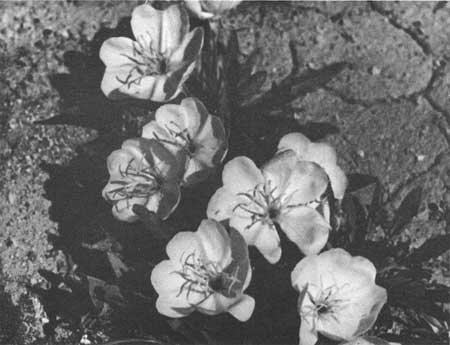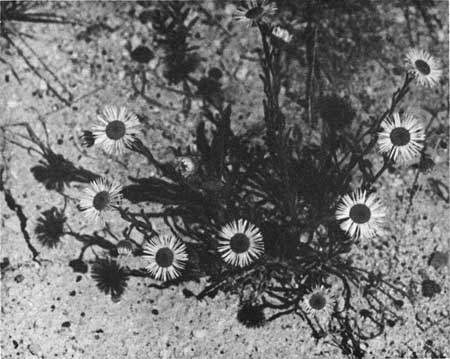|
BADLANDS National Park |
 |
Plants (continued)
WILDFLOWERS
When spring arrives and the sun climbs higher in the sky, this land of deeply cut canyons and strangely formed spires and capped knobs becomes a garden of warmth and freshness.
Early in April the AMERICAN PASQUEFLOWER, which is locally known as the crocus, and is the State flower of South Dakota, transforms overnight the bare hillsides, covering them with a pale-blue blanket. Clumps of TUFTED EVENING-PRIMROSE begin to show on the bald clay hills, opening in the evening in their white radiance and wilting the next day with the rising sun.
 Tufted evening-primrose |
May brings SEGOLILY MARIPOSA, with its cup-shaped flower on a stem, and COMMON STARLILY, with its stemless, narrow-petaled white blossom. The FENDLER WOODS ROSE is evident by the fragrance of its pink blossoms. The yellow of the PRAIRIE THERMOPSIS, better known as "wild pea," and the rose-purple clumps of LOCO and LAMBERT CRAZYWEED begin to show in the draws and ravines. The white or pink daisy-eyed FERNLEAF FLEABANE dots the roadside and the sides of the hills, and scattered patches of white or bluish HOODS PHLOX form mosslike mats.
 Wild Pea |
In June, yellow PLAINS ERYSIMUM, frequently called wallflower, appears by the roadside. Then come PENSTEMONS, or "wild snap dragons," in shades of blue and white. Bushy SNOW-ON-THE-MOUNTAIN EUPHORBIA begins to flower. If there have been adequate spring rains in the badlands, July will be brightened by blue CANADA VIOLET, orange splashes of SCARLET GLOBEMALLOW, and the yellow-and-brown nodding heads of UPRIGHT PRAIRIE-CONEFLOWER.
 Fleabane |
The introduced WHITE SWEETCLOVER lines the road through the passes. The white heads of WESTERN YARROW dot the prairie. COMMON PRICKLYPEAR, the most abundant form of cactus in the badlands, has budded and begins its yellow and pink floral display that covers the land as far as the eye can see.
By August and September, most of the flowers have bloomed and faded. Large masses of YELLOW SWEETCLOVER bloom along the roadsides. The coneflower and yarrow still persist, with an occasional scarlet globemallow remaining. The length of the season depends upon the rainfall; with occasional summer showers, the flowers continue their display; but if it is dry they soon wither and disappear.
 Wallflower |

|

|
|
|
|
Last Modified: Sat, Nov 4 2006 10:00:00 pm PST |


